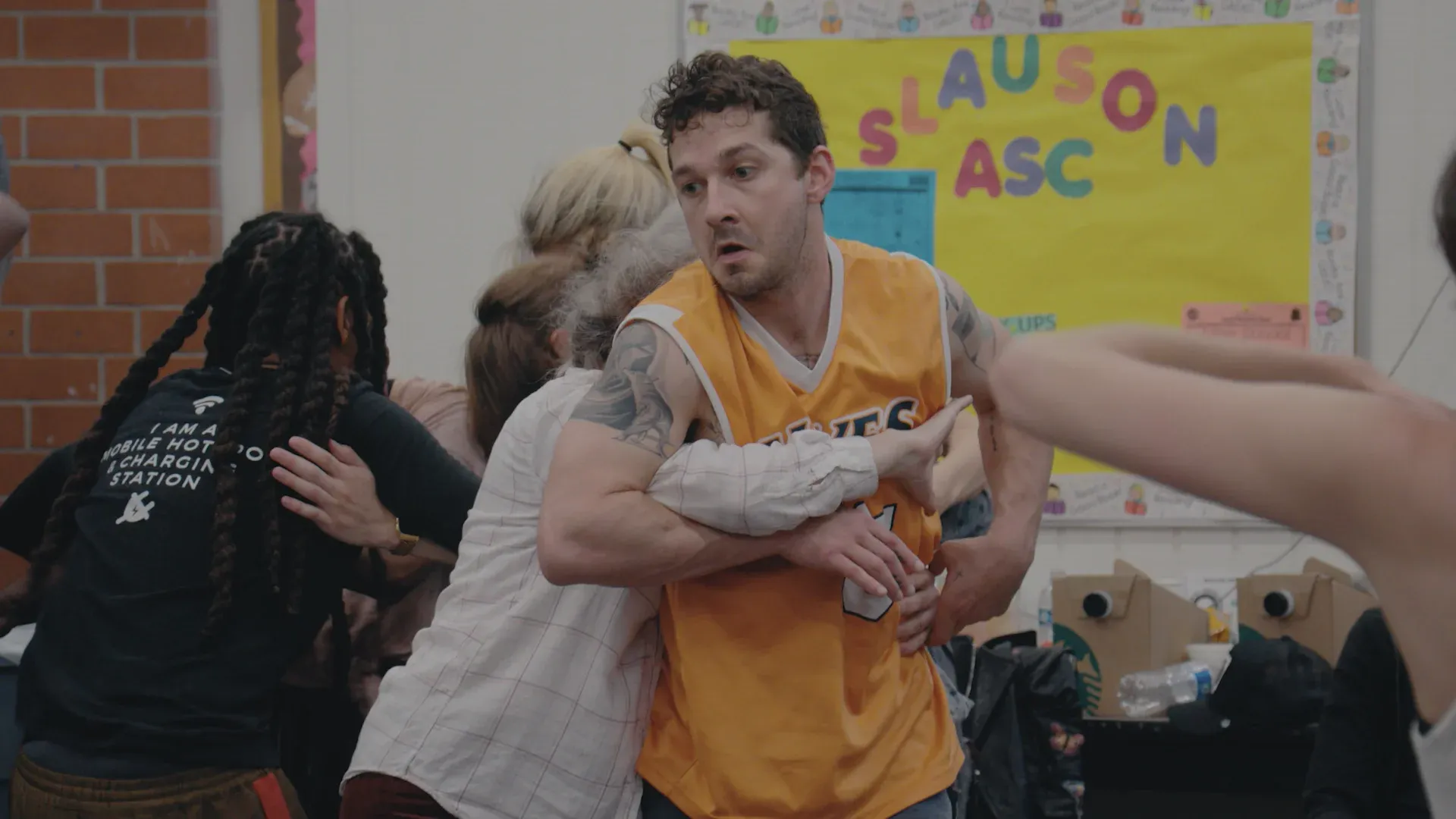Slauson Rec chronicles Shia LaBeouf’s invitation—via a 2018 Twitter video—to South Central Los Angeles residents to join a free weekly workshop at the Slauson Recreation Center. Over seven years of footage, director Leo Lewis O’Neil follows the project’s arc from informal movement and improvisation sessions to a pandemic-era multimedia play staged in a parking lot.
At its heart lies a tension between LaBeouf’s willingness to share creative space and the personal toll of sustaining an experimental ensemble under extreme conditions. Across nearly two and a half hours, the film alternates between moments of communal discovery and sharpened conflict, mirroring the push-and-pull of tradition meeting the urgency of a global crisis.
Viewers are invited to consider how a star’s personal drive both empowers and fractures a collective, and to reflect on the lines between mentorship and dominance as amplified by celebrity influence.
From Twitter Call to Drive-In Stage: The Project’s Growth
When LaBeouf issued his online summons, he tapped into a broader cultural impulse: the search for participatory art outside institutional walls. Respondents ranged from recent graduates of Los Angeles drama schools to neighborhood residents curious about his unconventional approach.
Early gatherings unfolded as devised theatre exercises—actors tracing each other’s movements, rapid-fire emotional prompts, and impromptu street performances. These sessions echoed global experimental troupes, from Grotowski’s laboratory theatre in Poland to Japan’s Butoh practitioners, all emphasizing embodiment over text.
By spring 2020, the workshop’s free-form ethos confronted COVID-19 realities. LaBeouf proposed 5711 Avalon, a scripted production set within its pandemic context: a drive-in drama about frontline workers staged in a South L.A. parking lot. This shift required formal design—lighting rigs, script drafts, masked rehearsals—and foregrounded the friction between improvisational roots and narrative demands.
The transition illustrates a universal challenge for community arts: preserving spontaneity while meeting audience expectations. Here, hybrid aesthetics—part guerrilla performance, part cinematic tableau—reflect both local resourcefulness and the global appetite for socially engaged storytelling during lockdown.
Leadership in Tension: Charisma, Authority and Participant Responses
LaBeouf’s presence commands each frame with kinetic energy. Early workshops showcase his magnetic pacing across the rec-center court, voice rising to exhort participants to “trust instinct.” His methods recall legendary coach-directors such as Lee Strasberg, yet filtered through a modern lens of raw vulnerability and public spectacle. Participants describe an initial surge of inspiration: non-actors discovering personal narratives in shared improvisations, each gesture carrying layers of lived experience in South Central’s social fabric.
Yet as rehearsals for 5711 Avalon intensified under pandemic pressures, LaBeouf’s intensity tipped into abrasive critique. He derided missed beats in movement drills, sometimes erupting with personal invective that echoed—and inverted—the supportive ethos he once invoked.
These confrontations expose a cross-cultural dimension: American notions of “tough love” clashing with community values that prize collective care over individual performance. Some members, like Ezekiel “Zeke” Pacheco, endured the tirades, finding in the crucible a path to resilience; others, such as Sarah Kaplan, withdrew when personal grief intersected with artistic demands.
Moments of self-reflection punctuate the turmoil—LaBeouf acknowledging his “god complex” or referencing his sobriety practices—but these serve more as interludes than turning points. The final sit-down interview finds him settled into family life, offering apology with measured candor. That sequence invites viewers to weigh accountability against performative repair: can genuine insight emerge from a process steeped in public exposure? Across cultures, the question resonates in any setting where leadership and art intersect under strain.
Crafting the Documentary Lens: Technique and Themes
O’Neil’s role as both archivist and participant yields a documentarian’s intimacy: handheld cameras, ambient workshop clamor, unpolished edits that heighten immediacy. The decision to retain repetitive exchanges—LaBeouf’s stinging rebukes or jubilant movement sequences—functions like a thematic refrain in world cinema, reminiscent of long-take ethnographies that immerse audiences in collective rituals. Yet the editing can verge on exhaustion, mirroring the troupe’s own emotional fatigue under relentless pacing.
Audio design privileges raw dialogue and environmental sounds: the scrape of sneakers on gym floors, murmured feedback loops, distant traffic—a sonic tapestry rooting the narrative in South Central’s urban rhythm. Occasional music cues underscore dramatic turns but recede to let the participants’ voices carry the film’s emotional weight. Visually, the shift from brightly lit gymnasiums to neon-glow parking-lot nights parallels the group’s passage from open exploration to structured enactment.
Underneath this lies a thematic inquiry into creativity amid crisis. The film suggests that artistic innovation often arises from constraint—pandemic protocols forced a rethinking of space and form, yielding a hybrid theatre-film experience. At the same time, it interrogates the perils of charisma unmodulated by communal accountability. By situating LaBeouf’s personal arc within a broader context of community resilience and cultural exchange, Slauson Rec captures a moment when global disruption reshaped the possibilities—and limits—of collaborative art.
Slauson Rec premiered at the 2025 Cannes Film Festival in the Cannes Classics section, offering audiences a candid look into the intersection of art, mentorship, and personal transformation.
Full Credits
Director: Leo Lewis O’Neil
Writer: Leo Lewis O’Neil
Producers: Leo Lewis O’Neil, Matt Zien, Kevin Knight
Cast: Shia LaBeouf
Composer: Adam Peters
The Review
Slauson Rec
Verdict: Slauson Rec is a raw chronicle of creative ambition tested by real-world pressures. Its unfiltered footage offers a rare window into how community spirit and star-driven intensity collide under pandemic constraints, revealing both inspiration and strain. While its length and repetitive moments can challenge viewers, the film’s cultural resonance and thematic depth make it a compelling record of collaborative art in crisis.
PROS
- Intimate, immersive access to an unconventional community experiment
- Revelatory portrayal of creative resilience during the pandemic
- Raw, unedited moments that highlight genuine emotion
- Cross-media blend of theatre and documentary aesthetics
CONS
- Extended runtime with some repetitive scenes
- Abrasive leadership moments that can feel overwhelming
- Limited background on key participants beyond LaBeouf
- Occasional uneven pacing between workshop and production phases
